#hot union summer
Explore tagged Tumblr posts
Text
In December, 2020, in the depths of pandemic winter, the actress Kimiko Glenn got a foreign-royalty statement in the mail from the screen actors’ union, SAG-AFTRA. Glenn is best known for playing the motormouthed, idealistic inmate Brook Soso on the women’s-prison series “Orange Is the New Black,” which ran from 2013 to 2019, on Netflix. The orchid-pink paper listed episodes of the show that she’d appeared on (“A Whole Other Hole,” “Trust No Bitch”) alongside tiny amounts of income (four cents, two cents) culled from overseas levies—a thin slice of pie from the show that had thrust her to prominence. “I was, like, Oh, my God, it��s just so sad,” Glenn recalled. With many television and movie sets shuttered, she was supporting herself with voice-over jobs, and she’d been messing around with TikTok. She posted a video in which she scans the statement—“I’m about to be so riiich!”—then reaches the grand total of $27.30 and shrieks, “WHAT?”
The post got more than four hundred thousand likes and nearly two thousand comments, many from disbelieving fans: “Wait how is that even legal??” “how is this even real you were on one of the biggest netflix shows.” This past May, with screenwriters on strike and labor unrest sweeping Hollywood, Glenn reposted the video on Instagram, where she has almost a million followers. This time, not only fans but castmates weighed in. Matt McGorry, who played a corrections officer: “Exaccctttlllyyy. I kept my day job the entire time I was on the show because it paid better than the mega-hit TV show we were on.” Beth Dover, who played a manager at the company taking over the prison: “It actually COST me money to be in season 3 and 4 since I was cast local hire and had to fly myself out, etc. But I was so excited for the opportunity to be on a show I loved so I took the hit. Its maddening.”
Television actors have traditionally had a base of income from residuals, which come from reruns and other forms of reuse of the shows in which they’ve appeared. At the highest end, residuals can yield a fortune; reportedly, the cast of “Friends” has each made tens of millions of dollars from syndication. But streaming has scrambled that model, endangering the ability of working actors to make a living. “So many of my friends who have nearly a million followers, who are doing billion-dollar franchises, don’t know how to make rent.”
Despite the Beatlemania-like fame, many cast members had to keep their day jobs for multiple seasons. They were waiting tables, bartending. DeLaria continued doing live gigs to keep up with her rent. Diane Guerrero, who played the fashionable inmate Maritza Ramos, worked at a bar, where patrons would recognize her.
These are just some highlights, but the entire article is worth a read, especially if someone you know is (or you are) so deep into watching celebrity culture that you’re having a hard time understanding why actors could possibly want more than they’re getting now.
#orange is the new black#netflix#streaming#actors#residuals#royalties#wga strike#sag-aftra strike#solidarity forever#hot union summer#summer of strikes
54 notes
·
View notes
Text

it really is hot union summer. best news about Grindr in ages
31 notes
·
View notes
Text
W GA CONTRACT SUMMARY IS OUT!!! A lot of it good, I'm not seeing stuff on others (i.e. I can't find stuff on if reruns on streamings get residuals) but they could be holding onto it. A lot of it is good!
7 notes
·
View notes
Text
#starbucks#labor movement#hot union summer#labor organizing#please sign and share#petition#petitions#please sign this petition#please share#please sign#unionize#union solidarity#solidarity forever
3 notes
·
View notes
Text
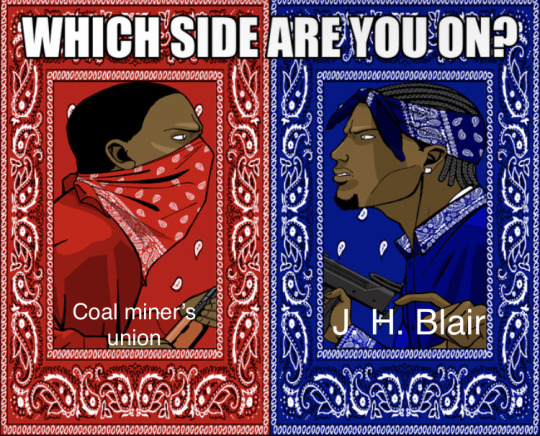
#HotUnionSummer do you know your roots?
#hot union summer#Harlan county war#pete seeger#union strong#pro union#which side are you on?#unions#coal mining#acab
3 notes
·
View notes
Text
NEW UNION JUST DROPPED

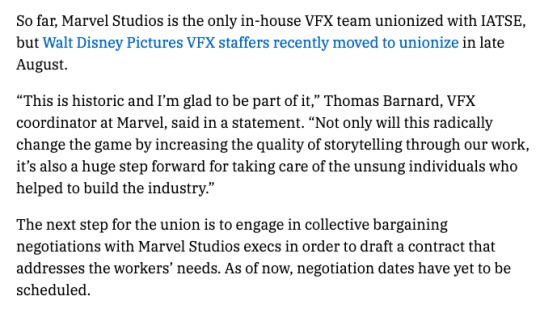
LET'S GOOOOOOO
#original post#marvel#mcu#hot labor summer#vfx#unions#wga strike#sag aftra strike#writers strike#actors strike
45K notes
·
View notes
Text
just in case anyone missed this in the news or maybe not in the loop, Disney is currently refusing to meet with or acknowledge the newly formed animation production workers union that just voted to join IASTE and become an official part of TAG, the animators and animation artists guild
production workers across all studios are currently voting to be recognized for their hard work and invaluable skill at keeping these productions running, but studios are refusing to meet with them to let them negotiate deals or even exist
as someone who works in animation as a designer i know i wouldn't be able to do my job at all without any of my production workers. they are the incredibly hard working people who oversee pretty much everything in animation. they make sure everything is running on time, that schedules are being followed, they have to know pretty much every single word of the scripts and beats from the storyboards to make sure nothing is missed, and most importantly, they make sure artists are being taken care of and not overworked. they really are the unsung heroes of the animation world
production workers are also by far the most exploited workers in animation currently. they make about a fraction of what artists make for just as much work put in, and currently have no agreement for health coverage or other benefits that artists protected by the union are guaranteed
BUT! there is some good news. right now there's a petition on IATSE's website that has over 80,000 signatures currently addressed to disney leadership to do the right thing and meet with this new union and recognized their vote to form. it still needs roughly 21,000 signatures and only takes a minute to sign! anyone with a zip or postal code can sign, meaning both US and Canadian residents can sign and help this union get the deal it deserves!!
#unions#IATSE strike#strikes#union strong#the animation guild#sag aftra#animation news#figured i would make this a sperate post just to try and reach more people! please consider signing!!#hot strike summer
31K notes
·
View notes
Text
Hollywood studios are focused on their bottom line. A studio executive told Deadline that the AMPTP’s endgame is to “allow things to drag on until union members start losing their apartments and losing their houses.” Bob Iger, the CEO of Disney, recently told CNBC that the strikes are “very disturbing” to him. He went on to note that it’s not helping the industry recover from the pandemic, and says some of the writers’ and actors’ expectations are “just not realistic.”
For reference, Iger is able to earn up to $27 million per year. Variety estimates the average Hollywood writer’s salary is about $260,000, though the WGA contends that weekly pay has dropped approximately 23%, adjusted for inflation, since 2014 (the WGA does not release median numbers). Meanwhile, the median actors’ salary hovered around $46,000 in 2021, according to US News.
26 notes
·
View notes
Text
here's today's New Fun Thought: we need a Sin Coordinator for film and TV. Like directors and studios need coordinators for so many things they have no idea how to do, and while nobody is free of sin some ppl just...don't know how things work.
that's my pitch. sin coordinator. teach them how to sin, in a safe, OSHA-approved way
0 notes
Text
#fight for 15#please sign and share#petition#petitions#please sign this petition#please share#please sign#labor organizing#hot labor summer#hot union summer
2 notes
·
View notes
Text
Ah yes the hot union summer rolls on.
13 Jul 23
49K notes
·
View notes
Text


Source
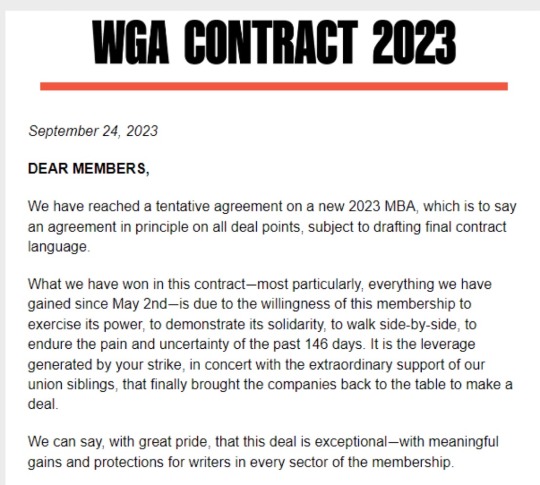
LET’S GO
#hot labor summer ending on the right note#writers strike#unions#good news#news#wga#current events#unionize#working class#solidarity#capitalism#workers rights#the left
2K notes
·
View notes
Text
Housing is a labor issue
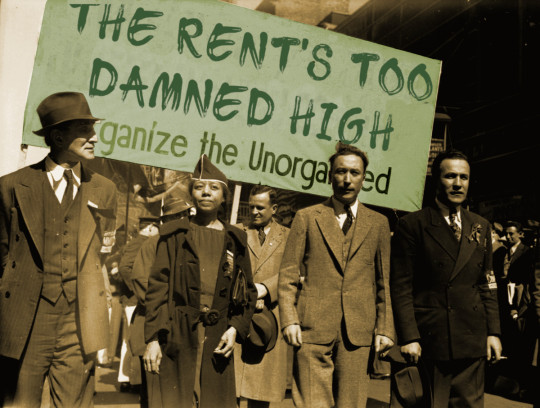
There's a reason Reagan declared war on unions before he declared war on everything else – environmental protection, health care, consumer rights, financial regulation. Unions are how working people fight for a better world for all of us. They're how everyday people come together to resist oligarchy, extraction and exploitation.
Take the 2019 LA teachers' strike. As Jane McAlevey writes in A Collective Bargain, the LA teachers didn't just win higher pay for their members! They also demanded (and got) an end to immigration sweeps of parents waiting for their kids at the school gate; a guarantee of green space near every public school in the city; and on-site immigration counselors in LA schools:
https://pluralistic.net/2023/04/23/a-collective-bargain/
Unionization is enjoying an historic renaissance. The Hot Labor Summer transitioned to an Eternal Labor September, and it's still going strong, with UAW president Shawn Fain celebrating his members victory over the Big Three automakers by calling for a 2028 general strike:
https://www.teenvogue.com/story/uaw-general-strike-no-class
The rising labor movement has powerful allies in the Biden Administration. NLRB general counsel Jennifer Abruzzo is systematically gutting the "union avoidance" playbook. She's banned the use of temp-work app blacklists that force workers to cross picket lines:
https://pluralistic.net/2023/07/30/computer-says-scab/#instawork
She's changed the penalty for bosses who violate labor law during union drives. It used to be the boss would pay a fine, which was an easy price to pay in exchange for killing your workers' union. Now, the penalty is automatic recognition of the union:
https://pluralistic.net/2023/09/06/goons-ginks-and-company-finks/#if-blood-be-the-price-of-your-cursed-wealth
And while the law doesn't allow Abruzzo to impose a contract on companies that refuse to bargain their unions, she's set to force those companies to honor other employers' union contracts until they agree to a contract with their own workers:
https://onlabor.org/gc-abruzzo-just-asked-the-nlrb-to-overturn-ex-cell-o-heres-why-that-matters/
She's also nuking TRAPs, the deals that force workers to repay their employers for their "training expenses" if they have the audacity to quit and get a better job somewhere else:
https://pluralistic.net/2023/09/14/prop-22-never-again/#norms-code-laws-markets
(As with every aspect of the Biden White House, its labor policy is contradictory and self-defeating, with other Biden appointees working to smash worker power, including when Biden broke the railworkers' strike:)
https://pluralistic.net/2023/09/18/co-determination/#now-make-me-do-it
A surging labor movement opens up all kinds of possibilities for a better world. Writing for the Law and Political Economy Project, UNITE Here attorney Zoe Tucker makes the case for unions as a way out of America's brutal housing crisis:
https://lpeproject.org/blog/why-unions-should-join-the-housing-fight/
She describes how low-waged LA hotel workers have been pushed out of neighborhoods close to their jobs, with UNITE Here members commuting three hours in each direction, starting their work-days at 3AM in order to clock in on time:
https://twitter.com/MorePerfectUS/status/1669088899769987079
UNITE Here members are striking against 50 hotels in LA and Orange County, and their demands include significant cost-of-living raises. But more money won't give them back the time they give up to those bruising daily commutes. For that, unions need to make housing itself a demand.
As Tucker writes, most workers are tenants and vice-versa. What's more, bad landlords are apt to be bad bosses, too. Stepan Kazaryan, the same guy who owns the strip club whose conditions were so bad that it prompted the creation of Equity Strippers NoHo, the first strippers' union in a generation, is also a shitty landlord whose tenants went on a rent-strike:
https://pluralistic.net/2023/05/20/the-missing-links/#plunderphonics
So it was only natural that Kazaryan's tenants walked the picket line with the Equity Stripper Noho workers:
https://twitter.com/glendaletenants/status/1733290276599570736?s=46
While scumbag bosses/evil landlords like Kazaryan deal out misery retail, one apartment building at a time, the wholesale destruction of workers' lives comes from private equity giants who are the most prolific source of TRAPs, robo-scabbing apps, illegal union busting, and indefinite contract delays – and these are the very same PE firms that are buying up millions of single-family homes and turning them into slums:
https://pluralistic.net/2022/02/08/wall-street-landlords/#the-new-slumlords
Tucker's point is that when a worker clocks out of their bad job, commutes home for three hours, and gets back to their black-mold-saturated, overpriced apartment to find a notice of a new junk fee (like a surcharge for paying your rent in cash, by check, or by direct payment), they're fighting the very same corporations.
Unions who defend their workers' right to shelter do every tenant a service. A coalition of LA unions succeeded in passing Measure ULA, which uses a surcharge on real estate transactions over $5m to fund "the largest municipal housing program in the country":
https://unitedtohousela.com/app/uploads/2022/05/LA_City_Affordable_Housing_Petition_H.pdf
LA unions are fighting for rules to limit Airbnbs and other platforms that transform the city's rental stock into illegal, unlicensed hotels:
https://upgo.lab.mcgill.ca/publication/strs-in-los-angeles-2022/Wachsmuth_LA_2022.pdf
And the hotel workers organized under UNITE Here are fighting their own employers: the hoteliers who are aggressively buying up residences, evicting their long-term tenants, tearing down the building and putting up a luxury hotel. They got LA council to pass a law requiring hotels to build new housing to replace any residences they displace:
https://www.latimes.com/california/story/2023-11-28/airbnb-operators-would-need-police-permit-in-l-a-under-proposed-law
UNITE Here is bargaining for a per-room hotel surcharge to fund housing specifically for hotel workers, so the people who change the sheets and clean the toilets don't have to waste six hours a day commuting to do so.
Labor unions and tenant unions have a long history of collaboration in the USA. NYC's first housing coop was midwifed by the Amalgamated Clothing Workers of America in 1927. The Penn South coop was created by the International Ladies Garment Workers’ Union. The 1949 Federal Housing Act passed after American unions pushed hard for it:
http://www.peterdreier.com/wp-content/uploads/2014/07/Labors-Love-Lost.pdf
It goes both ways. Strong unions can create sound housing – and precarious housing makes unions weaker. Remember during the Hollywood writers' strike, when an anonymous studio ghoul told the press the plans was to "allow things to drag on until union members start losing their apartments and losing their houses?"
Vienna has the most successful housing in any major city in the world. It's the city where people of every income and background live in comfort without being rent-burdened and without worry about eviction, mold, or leaks. That's the legacy of Red Vienna, the Austrian period of Social Democratic Workers' Party rule and built vast tracts of high-quality public housing. The system was so robust that it rebounded after World War II and continues to this day:
https://www.politico.eu/article/vienna-social-housing-architecture-austria-stigma/
Today, the rest of the world is mired in a terrible housing crisis. It's not merely that the rent's too damned high (though it is) – housing precarity is driving dangerous political instability:
https://pluralistic.net/2021/06/06/the-rents-too-damned-high/
Turning the human necessity of shelter into a market commodity is a failure. The economic orthodoxy that insists that public housing, rent control, and high-density zoning will lead to less housing has failed. rent control works:
https://pluralistic.net/2023/05/16/mortgages-are-rent-control/#housing-is-a-human-right-not-an-asset
Leaving housing to the market only produces losers. If you have the bad luck to invest everything you have into a home in a city that contracts, you're wiped out. If you have the bad luck into invest everything into a home in a "superstar city" where prices go up, you also lose, because your city becomes uninhabitable and your children can't afford to live there:
https://pluralistic.net/2021/09/27/lethal-dysfunction/#yimby
A strong labor movement is the best chance we have for breaking the housing deadlock. And housing is just for starters. Labor is the key to opening every frozen-in-place dysfunction. Take care work: the aging, increasingly chronically ill American population is being tortured and murdered by private equity hospices, long-term care facilities and health services that have been rolled up by the same private equity firms that destroyed work and housing:
https://pluralistic.net/2023/04/26/death-panels/#what-the-heck-is-going-on-with-CMS
In her interview with Capital & Main's Jessica Goodheart, National Domestic Workers Alliance president Ai-jen Poo describes how making things better for care workers will make things better for everyone:
https://prospect.org/labor/2023-12-13-labor-leader-ai-jen-poo-interview/
Care work is a "triple dignity investment": first, it makes life better for the worker (most often a woman of color), then, it allows family members of people who need care to move into higher paid work; and of course, it makes life better for people who need care: "It delivers human potential and agency. It delivers a future workforce. It delivers quality of life."
The failure to fund care work is a massive driver of inequality. America's sole federal public provision for care is Medicaid, which only kicks in after a family it totally impoverished. Funding care with tax increases polls high with both Democrats and Republicans, making it good politics:
https://www.dataforprogress.org/blog/2021/4/7/voters-support-investing-in-the-care-economy
Congress stripped many of the care provisions from Build Back Better, missing a chance for an "unprecedented, transformational investment in care." But the administrative agencies picked up where Congress failed, following a detailed executive order that identifies existing, previously unused powers to improve care in America. The EO "expands access to care, supports family caregivers and improves wages and conditions for the workforce":
https://www.whitehouse.gov/briefing-room/presidential-actions/2023/04/18/executive-order-on-increasing-access-to-high-quality-care-and-supporting-caregivers/
States are also filling the void. Washington just created a long-term care benefit:
https://apnews.com/article/washington-long-term-care-tax-disability-cb54b04b025223dbdba7199db1d254e4
New Mexicans passed a ballot initiative that establishes permanent funding for child care:
https://www.cwla.org/new-mexico-votes-for-child-care/
New York care workers won a $3/hour across the board raise:
https://inequality.org/great-divide/new-york-budget-fair-pay-home-care/
The fight is being led by women of color, and they're kicking ass – and they're doing it through their unions. Worker power is the foundation that we build a better world upon, and it's surging.

If you'd like an essay-formatted version of this post to read or share, here's a link to it on pluralistic.net, my surveillance-free, ad-free, tracker-free blog:
https://pluralistic.net/2023/12/13/i-want-a-roof-over-my-head/#and-bread-on-the-table
#pluralistic#labor#hot labor summer#eternal labor september#jane mcalevey#los angeles#weaponized shelter#housing#airbnb#equity strip noho#tenants unions#red vienna#jennifer abruzzo#nlrb#the rent's too damned high
1K notes
·
View notes
Text
Version that doesn't require sign-in.
"Hot Labor Summer just became a scorcher.
[On August 25, 2023], the National Labor Relations Board released its most important ruling in many decades. In a party-line decision in Cemex Construction Materials Pacific, LLC, the Board ruled that when a majority of a company’s employees file union affiliation cards, the employer can either voluntarily recognize their union or, if not, ask the Board to run a union recognition election. If, in the run-up to or during that election, the employer commits an unfair labor practice, such as illegally firing pro-union workers (which has become routine in nearly every such election over the past 40 years, as the penalties have been negligible), the Board will order the employer to recognize the union and enter forthwith [a.k.a. immediately] into bargaining.
The Cemex decision was preceded by another, one day earlier, in which the Board, also along party lines, set out rules for representation elections which required them to be held promptly after the Board had been asked to conduct them, curtailing employers’ ability to delay them, often indefinitely.
Taken together, this one-two punch effectively makes union organizing possible again, after decades in which unpunished employer illegality was the most decisive factor in reducing the nation’s rate of private-sector unionization from roughly 35 percent to the bare 6 percent at which it stands today...
“This is a sea change, a home run for workers,” said Brian Petruska, an attorney for the Laborers Union who authored a 2017 law review article on how to effectively restore to workers their right to collective bargaining enshrined in the 1935 National Labor Relations Act, which was all but nullified by the act’s weakening over the past half-century. Taken together, Petruska added, last week’s decisions recreate “a system with no tolerance for employers’ coercion of their employees” when their employees seek their legal right to collective bargaining...
Since the days of Lyndon Johnson, every time that the Democrats have controlled the White House and both houses of Congress, they’ve tried to put some teeth back into the steadily more toothless NLRA. But they’ve never managed to muster the 60 votes needed to get those measures through the Senate. The Cemex ruling actually goes beyond much of what was proposed in those never-enacted bills."
-via The American Prospect, August 28, 2023
--
Note: I didn't include it because the paragraphs about it went super into the weeds, but the reason all of this is happening is because of the NRLB's general counsel, Jennifer Abruzzo, who was appointed by Biden. In fact, according to this article, this "secures Abruzzo’s place as the most important public official to secure American workers’ rights since New York Sen. Robert Wagner, who authored the NLRA in 1935." Voting matters
#labor#labor rights#labor unions#workers rights#unions#unionize#nlrb#national labor relations board#biden#biden administration#united states#us politics#voting matters#american politics#organized labor#union busting#good news#hope#hope posting#hot labor summer#pro union
1K notes
·
View notes
Text


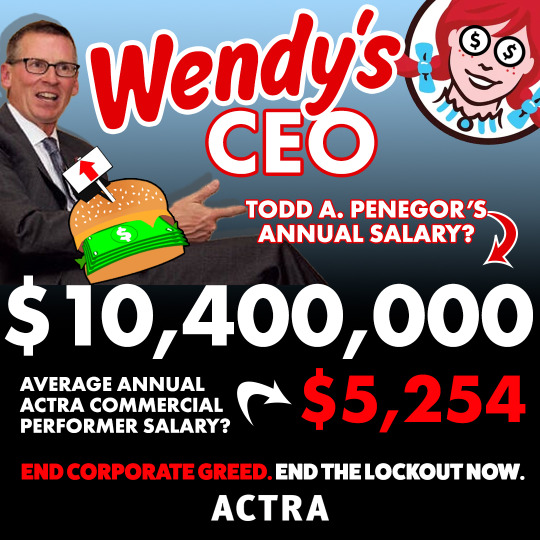

Canadian union actors have been locked out of commercial work by union-busting agencies for over 500 days.
Because a lot of people don't really understand what is happening here, I'm going to take a moment to talk about what a lockout is.
A lockout is like the opposite of a strike: in a strike, workers withhold their labour until employers agree to their demands for improved conditions, while in a lockout employers essentially starve workers of work-- and by extension, crucially, wages-- to force them into accepting unacceptable conditions.
In the context of a factory, it might look like literally shutting down the factory because the owner can afford to simply eat the short-term loss while they sit and wait for the workers to grow desperate. Or they may bring in what are euphemistically referred to as "replacement workers". You may know them by the more familiar term: scabs. Those who are willing to put up with more for less, and in so doing worsen labour conditions across the whole industry. This is economically advantageous to the employers, and they can just sit there in comfort while they wait for the union and its members to break.
A lockout is a cruel power play in what is already an unequal relationship. It is intentional infliction of desperation and psychological distress.
The Institute of Canadian Agencies' lockout of ACTRA members has been going on for more than 500 days. It has intentionally inflicted more than 500 days of psychological distress and existential threat on thousands of people. And in the midst of this the ICA has done little but employ DARVO strategies (deny, attack, reverse victim and offender), when it has initiated this essentially in protest of not being given the freedom to slash union commercial actors' compensation by 80%. ACTRA has been ready and willing to bargain this whole time, but the ICA insists it's ACTRA holding its own members down.
The ICA's client companies are hugely recognised brands whose CEOs take home untold millions every year in salaries while the average ACTRA commercial actor makes well under 10k a year. Professional actors' work is important and needed-- if it wasn't the agencies wouldn't be bringing in scabs-- and yet they are forced into conditions where they literally cannot live. They cannot afford to put a roof over their heads and food on the table in the middle of a cost-of-living crisis.
PLEASE share this and let union actors know you stand with them. Boycott these companies who hire union-busting agencies. Write to them and let them know why. This fight has been long and demoralising, and folks are exhausted and sad, and given all the attention that has rightly been on the striking WGA and SAG-AFTRA members (with whom ACTRA has been rallying together in solidarity), their Canadian sibling union needs your solidarity and support too.
#actra#wga strike#sag aftra strike#hot labor summer#union strong#canada#lockouts are fucking nasty#i literally cannot deal with how much this is hurting people#also yes a boycott has been called for
76 notes
·
View notes
Note
I hope this is ok but what are your thoughts on this post about the strike? https://www.tumblr.com/cardassiangoodreads/722760134055559168/some-of-you-might-remember-a-couple-of-years-ago
I think it's a good reminder that the studios will definitely try to portray striking actors as greedy, when the entertainment corporations are the ones who regularly engage in borderline illegal accounting practices and look to screw creatives every chance they get. They'd much rather smear the WGA and SAG-AFTRA than negotiate in good faith.
#ask me anything#tv writing#ask me stuff#stand with the wga#wgawest#wga west#wga strike#support the wga#wga strong#sag strike#union strong#sag aftra#hot labor summer
73 notes
·
View notes